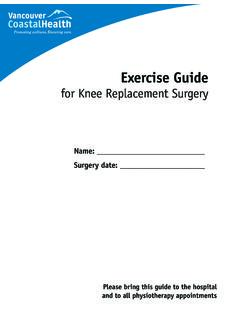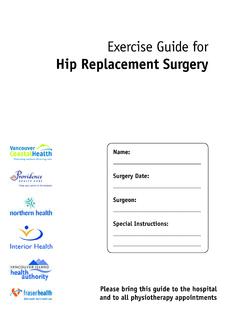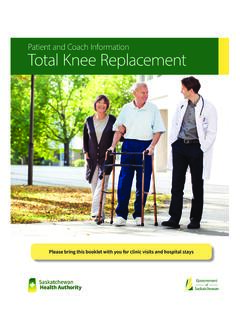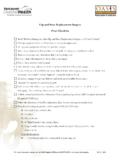Transcription of Hip and Knee Replacement Surgery - Search
1 Before, During and After Hip and knee Replacement Surgery A PATIENT S GUIDEOAS S AcknowledgmentsWe would also like to thank the joint Replacement clients who participated in the revision process of this booklet. Your feedback and suggestions will be of great help to people who are preparing for joint Replacement Surgery . This revised booklet is based on information produced over the years by a variety of organizations. We would like to acknowledge the contributions made by: The Arthritis Society, BC & Yukon Division The Mary Pack Arthritis Program Hip Hip Hooray BC Orthopedic Association Canadian Orthopedic FoundationThis edition of the booklet was developed by OASIS (OsteoArthritis Service Integration System) at Vancouver Coastal Health in partnership with staff at: Vancouver Island Health Authority Northern Health Authority Interior Health Authority Fraser Health Authority Providence Health CareOAS SContentsHip Surgery Hip Anatomy.
2 7 Hip Replacement Surgery ..8 Joint Components and Attachment ..9 Hip Precautions ..10 knee Surgery knee Anatomy ..15 knee Replacement Surgery ..16 Joint Components and Attachment ..16 knee Precautions ..18 Before Surgery Home Set-Up ..23 Exercise ..28 Nutrition ..29 Weight Management ..30 Pre-Operative Education ..31 Pre-Admission Clinic ..31 Final Checklist Before Surgery ..32 During Your Hospital Stay Day of Surgery ..35 Length of stay ..37 Rehabilitation ..38 Pain Control ..39 Preventing Blood Clots ..42 Going Home ..42 After Surgery Recovery At Home ..45 Returning to Work ..53 Complications ..54 Resources ..61 Index.
3 62 Hip SurgeryKnee SurgeryBefore SurgeryHospital StayAfter SurgeryResourcesYou are about to have hip or knee Replacement Surgery . Patients who are prepared for Surgery and who take part in their care can recover in less time and with less pain. This booklet will give you the general information you need to get yourself, your family and your home ready for Surgery . Read this booklet with care and bring it to the hospital when you go for Surgery . We hope that you find this booklet a useful reference guide before, during and after your joint Replacement Surgery . *IMPORTANT: If your surgeon or health care team gives you different advice than what has been provided in this booklet, please follow the specific directions you you still have questions about joint Replacement Surgery ?
4 Would you like to talk to someone who has gone through the Surgery ? If so, Ortho Connect is for you! It is a program through the Canadian Orthopedic Foundation that will connect you with a volunteer who has gone through a similar surgical treatment. You will be able to ask the volunteer questions about what to expect through this experience and get useful tips on how to cope. More information is available at: (click on Have questions about your orthopaedic Surgery ? Access free patient support ) or phone 1-800-461-3639 4 | Before, During & After Hip and knee Replacement Surgery Hip SurgeryIn this section, you will learn about: Hip Anatomy Hip Disease Total Hip Replacement Surgery Hip Resurfacing Surgery Hip Revision Surgery Artificial Joint Components Joint Attachment (Fixation) HIP PRECAUTIONS Hip SurgeryBefore, During & After Hip and knee Replacement Surgery | 7 Hip Anatomy The hip joint is a ball and socket joint that s why you can move your hip in many directions.
5 The ball is the round head of the thigh bone (femur). It moves in the socket of your pelvis (acetabulum). Muscles and ligaments support and strengthen the joint. Hip DiseaseThe most common reason for joint Replacement Surgery is OSTEOARTHRITIS. Osteoarthritis results in the breakdown of cartilage on the ends of the bones. It usually appears in joints that carry your body weight, such as hips and knees. Osteoarthritis can cause joint pain and stiffness. Advanced joint damage can be repaired through joint Replacement disease conditions may also lead to damage of the joint, requiring joint Replacement Surgery . These include conditions such as rheumatoid arthritis, bone infection or a lack of blood supply to the bone.
6 Talk to your doctor if you have questions about your joint health. Joint DamageNormal Hip JointFemurPelvisOsteoarthritic Hip JointWorn CartilageBone SpursAcetabulumCartilage 8 | Before, During & After Hip and knee Replacement Surgery Total Hip ReplacementIn total hip Replacement Surgery , the surgeon replaces the diseased joint with an artificial joint (prosthesis). First, the surgeon makes an incision and moves the muscles and ligaments away from the hip joint. Then the head of the thigh bone is replaced with an artificial ball and stem. The pelvic socket is smoothed and lined with a prosthetic cup. Then the joint is put back together with the ball fitted into the cup. Once the new joint is in place, the muscles and ligaments are repaired.
7 Your skin is closed with sutures or staples (staples are metal clips that hold your skin together while the incision heals). This Surgery takes about two hours. Today, many patients who have hip Replacement Surgery can move their joint more easily, have less pain and are able to walk more comfortably for up to 25 years after ResurfacingHip resurfacing is a type of hip Replacement Surgery that may be suggested by your surgeon based on a number of factors including the degree of damage to your joint and your overall this Surgery , the surgeon replaces the diseased joint with a special form of artificial joint (resurfacing prosthesis). First, the surgeon makes an incision and moves the muscles and ligaments away from the hip joint.
8 Then the damaged cartilage and some parts of the bone surface are removed from the head of the thigh bone (femur) and the hip socket (acetabulum). A ball-shaped cap is placed over the head of the thigh bone. The hip socket is smoothed and lined with a molded shell. Once the joint is put back together, the muscles and ligaments are repaired. Your skin is closed with sutures or staples (staples are metal clips that hold your skin together while the incision heals).Prosthetic cupHeadStemFemurPelvisArtificial Hip JointResurfacing prosthesisResurfaced Hip JointBefore, During & After Hip and knee Replacement Surgery | 9 Hip Revision (Repeat) Some people who have had a hip Replacement may need another Surgery because: The joint has dislocated The joint is loose or worn out There has been bone loss or an infection in the jointThese surgeries can be more complex and you may need more rehabilitation after Surgery .
9 You may not be able to carry as much weight on your new joint while you recover. Joint Components (Prosthetics)Artificial joint components may be made of medical-grade metal, plastic, ceramic or some combination of these materials. Your surgeon will determine the type of joint to be used, matching your individual needs with a suitable type of material. Joint Attachment (Fixation)The type of fixation used to secure the artificial joint in your body will depend on a variety of factors including your age, disease type and bone : The artificial joint pieces are secured to the bone with a quick-hardening adhesive. CEMENTLESS: The artificial joint pieces are closely fitted into the bones.
10 These pieces are covered in a rough material that encourages bone growth. Bone growth into the artificial joint can provide additional long-term joint stability. Some parts of the artificial joint may be screwed in place to keep the joint stable. HYBRID: In this type of Surgery , one piece of the artificial joint is attached with cement while the other piece is covered in a rough material that encourages bone growth. Bone growth into the artificial joint can provide additional long-term joint stability. Some parts of the artificial joint may be screwed in place to keep the joint stable. 10 | Before, During & After Hip and knee Replacement Surgery Hip PrecautionsAfter Hip Surgery , you will need to follow HIP PRECAUTIONS for 3 MONTHS unless otherwise advised by your surgeon.





